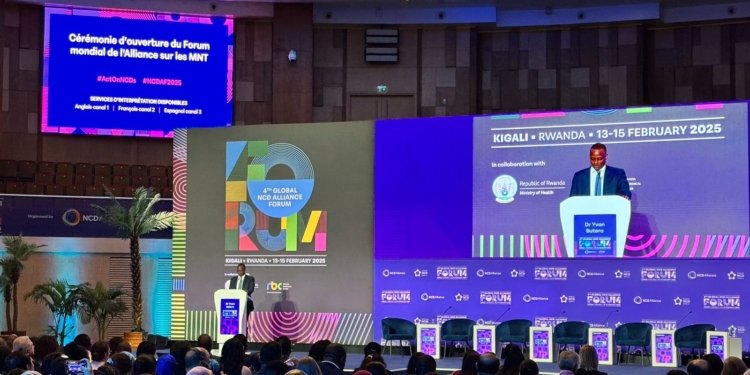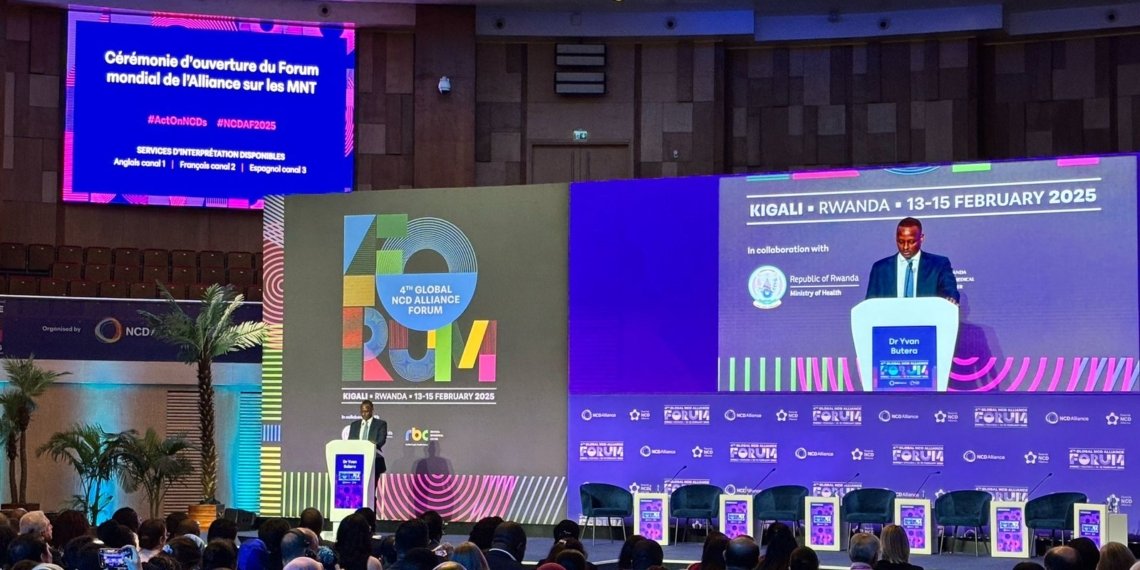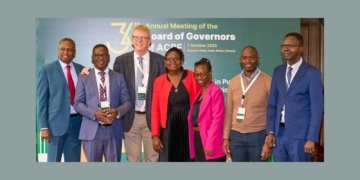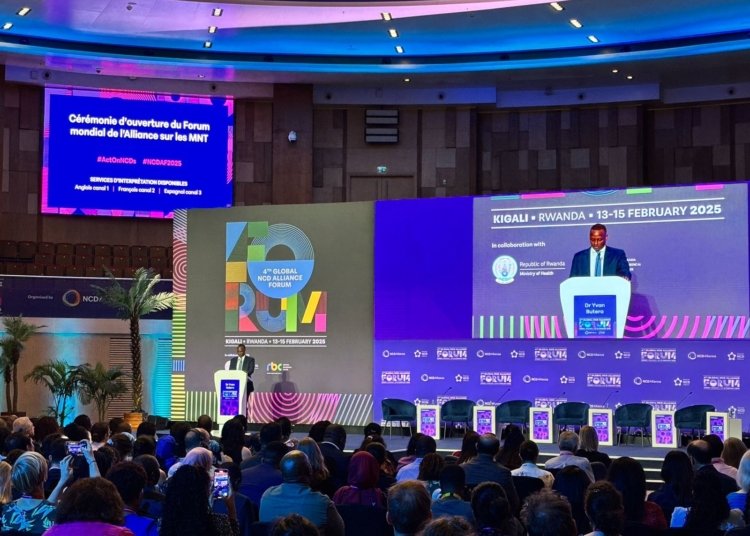KIGALI, Rwanda (Bantu Gazette) — For the first time, Africa is hosting the Global Noncommunicable Diseases (NCD) Alliance Forum, a high-level gathering of 700 advocates, experts, and ministerial representatives from more than 66 countries, aimed at addressing the growing NCD crisis and driving global action.
The fourth edition of the forum, from 13th to 15th February, comes at a crucial time as global health financing is under strain due to the U.S. freezing aid and withdrawing from the World Health Organization (WHO).
At the opening ceremony, Rwanda’s Minister of State for Health, Dr. Yvan Butera, emphasized the urgency of tackling noncommunicable diseases, which account for 74% of global deaths.
“Tackling NCDs requires innovation, investment, and global collaboration. Every effort counts,” he said.
Rwanda has taken decisive steps, focusing on NCD prevention—including recent taxation measures on harmful products such as tobacco.
Butera said NCD prevention is where Rwanda began its fight against NCDs.
The Rising Burden of NCDs in a Polycrisis Era
The forum takes place against a backdrop of mounting health challenges.
“We live in an era of polycrisis, with pandemics, climate change, conflicts and humanitarian crises locking horns across the globe,” said Katie Dain, CEO of the NCD Alliance. “At the centre of this storm are people living with NCDs.”
The statistics paint a sobering picture: 1 billion people live with obesity, 1.3 billion with hypertension, 1 billion with mental health disorders, and 500 million with diabetes and chronic respiratory diseases, according to the NCD Alliance.
“In the five short years since we last held the Forum in Sharjah in the UAE, we have lost 215 million people to NCDs. To put that in context, that is the population of Nigeria,” Dain said.
Beyond the sheer numbers, many African countries face a dual burden of infectious and non-communicable diseases.
While the continent has made strides in HIV treatment, longer lifespans mean that people with HIV now face increasing risks of NCDs, such as cardiovascular disease, diabetes, and neurocognitive disorders.
Rwanda’s Leadership in NCD Prevention and Universal Health Coverage
Rwanda stands out as a regional leader in healthcare access and system reform.
“We recognise NCDs as a priority health issue in Rwanda and across the sub-Saharan Africa region, where NCDs now account for more than a third of total deaths, a jump from 24% in 2000,” said Dr. Francois Uwinkindi, division manager for noncommunicable diseases at the Rwanda Biomedical Center.
He highlighted Rwanda’s proactive approach, which includes integrated primary care for NCDs, early screening and detection programs, and a robust community-based health insurance scheme that covers more than 90% of the population.
Notably, Rwanda has made healthcare more accessible for vulnerable groups, particularly in rural communities that previously faced geographical barriers to care.
The Global Health Equity Gap: The Cancer Crisis in Africa
Prisca Githuka, chairperson of the Cancer Survivors Association of Kenya, brought attention to stark inequities in global healthcare.
“The cancer care continuum in many lower- and middle-income countries is vastly different to that which people in the global north have access to,” she stressed.
She stated that while essential medicines like morphine are readily available in the Global North, many cancer patients in other regions endure treatment without it, often lacking access to radiotherapy or chemotherapy.
“The lives of people in the Global South are just as valuable as those in the North,” Githuka said, calling for greater investments in cancer care infrastructure.
Solutions, Partnerships, and the Path Forward
Progress is being made. The PEN-Plus model, an integrated care system for severe NCDs like type 1 diabetes, childhood heart disease, and sickle cell disease, is gaining momentum.
According to the NCD Alliance, Rwanda has scaled this model nationwide, training hundreds of health workers to improve NCD care.
Encouragingly, all 47 WHO African region member states have endorsed PEN-Plus as their official strategy.
Dr. Gina Agiostratidou, program director at the Helmsley Charitable Trust, stressed the role of partnerships in sustaining progress.
“Philanthropy will always play an important part in global health. Regardless of the shifting environment, Helmsley remains committed to driving sustainable, life-changing progress for people living with NCDs around the world,” she said.
In September 2025, Heads of State and Government will establish a new vision for preventing and controlling NCDs by 2030 and 2050 through a political declaration to be determined at the UN General Assembly.
“The NCD community is impatient for change,” Dain said. “This year’s Forum and upcoming High-Level Meeting is our opportunity to make it happen.”
The Kigali forum signals a defining moment in the global fight against NCDs. With rising health inequities, financing challenges, and policy setbacks, bold leadership is needed now more than ever.
Rwanda’s initiative-taking approach—focusing on prevention, taxation, and universal health coverage—offers a blueprint for Africa and beyond.
As the world prepares for the UN High-Level Meeting on NCDs, it’s time to move from talk to action, ensuring NCDs receive the political attention and funding they demand.



























